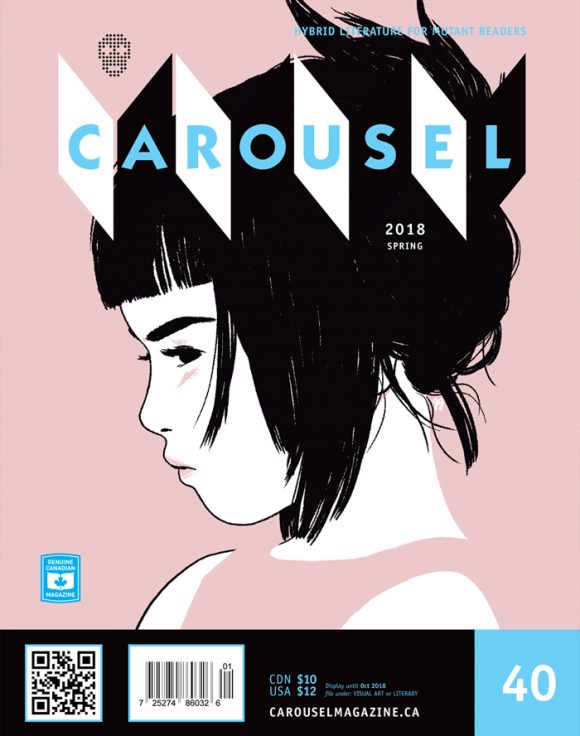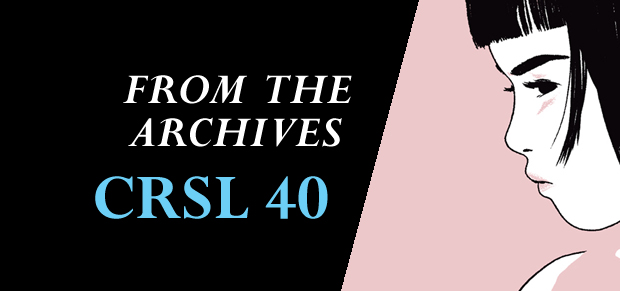From the Archive: Sandy Pool (CAROUSEL 40)
SANDY POOL
Excerpt from The Ebbinghaus Illusion: A Book of Hybrid Non-Fiction
The Ebbinghaus Illusion elegizes the death of my former partner who suffered from early-onset Alzheimer’s disease. After a short battle, my partner chose to take his life, rather than suffer the debilitating effects of the disease.
The Ebbinghaus Illusion is structured around a standardized Alzheimer’s memory test. Each piece is titled with a word from the Alzheimer’s word list, which is used to measure both cognitive capability and decline.
Given that I am speaking to you,
are you dead?
— Édouard Levé
The facts in logical space
are the world.
— Ludwig Wittgenstein
Instructions:
1.0
Draw a large circle in the space below.
1.1
Draw the face of a clock and put the
numbers in the correct positions.
1.11
Draw the hands on the clock to indicate
12:00.
1.12
Indicate all the time you have lost.
Photo
2.01
I decided to remember everything for you.
2.011
I wrote everything down, as if I too might
forget entirely.
2.012
In one notebook I wrote: he only ate the
crispy edges of fried clams and left the rest
on his plate. In another notebook it says
your face was angular, but not sharp.
2.013
I don’t know if these statements are true.
2.02
I can’t remember if you preferred cats or
dogs. I can’t remember if you felt like you
had slept with enough people. I can’t
remember the day you disappeared, or the
nights that followed.
2.021
I should have written things down in more
detail.
2.022
Even if the world is infinitely complex, so
that every fact consists of an infinite
number of atomic facts and every atomic
fact is composed of an infinite number of
objects, even then there must be objects
and atomic facts. That’s Wittgenstein.
2.024
Yesterday I found a photo from my sixth
birthday party. I am wearing an impossibly
frilly dress and sitting on my
grandmother’s lap. I am blowing out
candles on a nuclear pink ballerina cake.
2.8
I thought I had a memory of this birthday
party, but now I think I only have a
memory of the photo.
2.9
Photos are a strange ruse — simulacra with
no original.
2.10
There are no photographs of us together. In
fact, I have no photographs of you at all.
2.12
For four years, I have tried to remake you,
but I cannot remember the finer details of
your face.
2.13
The painter constructs, the photographer discloses.
That’s Sontag.
2.14
We make ourselves into pictures of facts.
That’s Wittgenstein.
2.15
In this sense, my memory is an alternative
to clay.
Anchor
3.001
Is your death a story or a plot?
3.01
You killed yourself. That isn’t much of a
story.
3.02
You once told me Russian formalists
believe that story is the chronological
unfolding of events, whereas plot is the
artistic arrangement.
3.03
Now that you are gone, who cares about the
order of things?
3.031
I never once said I loved you.
3.032
I suppose now, more than ever, I do.
3.04
Now. Then. Let us continue.
Letter
4.0
In 1878, a German philosopher, Hermann
Ebbinghaus, was the first to investigate the
properties of human memory.
4.001
Influenced by the British Empiricists,
Ebbinghaus assumed that the process of
committing something to memory involved
the formation of new associations, and that
these associations would be strengthened
through repetition.
4.002
To observe this process, he devised a set of
items to be committed to memory that
would have no previous associations, so-
called nonsense syllables.
4.003
These consist of a sequence: consonant,
vowel, consonant.
Test:
5.0
Cuts paper
5.1
Used on hair
5.2
Holds your money
5.3
A musical instrument
5.4
Doctor uses it to listen to your heart
5.5
Picks up food
Moon
6.0
What I said before was not exactly true. I
did not simply want to remake you.
6.001
I wanted chronology. I wanted to produce
an order, a logic.
6.002
I wanted a poetics of sense.
6.01
Aristotle believed that logic was related to
persuasion. I had not thought about
persuasion. What I thought about was
trying to remake you out of perfectly
logical pieces.
6.02
A statement is persuasive and credible either because it
is directly self-evident or because it appears to be
proved from other statements that are so. In either case
it is persuasive because there is somebody whom it
persuades. That’s Aristotle.
6.021
But how does one know if one’s statements are
credible? How is anything directly self-evident?
6.022
Aristotle also believed that women had fewer teeth than
men, and colder blood. He thought eels spontaneously
generated from mud, and the moon was a living,
breathing creature.
6.03
There can never be surprises in logic.
That’s Wittgenstein.
Phone
7.0
Yesterday I thought I saw your ghost sitting across the
street. Your ghost was clutching your tatty pastel-pink
backpack. I remember the first time I saw the backpack.
I asked “Why pink?” and you exclaimed: “Be the
change you want to see in the world!” “Gross.” I said.
And then I said: “You sound like a fridge magnet.”
7.001
After the tsunami of 2011, Japanese taxi drivers also
reported seeing ghosts. The drivers had taken fares
from people, only to find that the people had vanished
during the ride.
7.002
One driver described how he picked up a woman who
wanted to be dropped off in the Minamihama district.
When the driver explained that the area had been wiped
out in the Tsunami, he claimed the woman said: Have I
died?
7.003
When he turned to speak to her, there was no one else
in the car.
7.01
The article I was reading claimed that seeing ghosts
was most strongly connected to PTSD sufferers who
had ‘experienced tremendous shock as a result of a
traumatic event that happened to a close relative,
friend or significant other.’ Apparently one in five sufferers of
PTSD reported seeing something that others could not
see.
7.011
I’m not convinced you are a ghost. When I looked back
across the street, you were still sitting there. As far as I
could see, your pink backpack and unfortunate
vernacular expressions were still seemingly intact.
7.012
In another article I read, a Japanese man installed a
phone booth with an old rotary phone in his backyard to
communicate with his dead cousin. Although the
phone was not hooked up, the man could imagine
talking to his cousin as a way to deal with his grief.
After the tsunami of 2011, people started making
pilgrimages to the phone to talk to those who had
perished.
7.013
What would I tell you on the phone? What would I tell
your ghost? There is not enough time to say everything.
Instead, I would ask questions.
7.014
On the Japanese rotary phone the man asked his wife:
Is it cold there?
7.015
Is it cold where you are?
Bread
8.0
The first time it happened, we were both
standing at the kitchen sink. I was making
toast but you weren’t calling it toast. You
kept asking for ‘charred bread.’
8.01
We were both laughing. I thought you were
trying to be clever.
8.02
Your confusion became a recurring joke.
Every time we talked about food, I would
ask you if you would like some charred
bread.
8.03
The next time I saw you, you were having
trouble counting change. I started sending
you memes that said: At my age ‘getting
lucky’ means walking into a room and
remembering what I came in for.
8.04
You were 42 years old.
8.05
I was also forgetful, but I called it PADD
(Poet’s Attention Deficit Disorder). I told you
that all artists are forgetful when it comes to
practical things. This is so that we have
room for all of our beautiful completely
impractical ideas.
8.06
Blessed are the forgetful, for they get the better even of
their blunders. That’s Nietzsche.
8.07
I didn’t worry until November, when you
forgot the word for snow.

Excerpt from The Ebbinghaus Illusion: A Book of Hybrid Non-Fiction
appears in CAROUSEL 40 (2018) — buy it here

